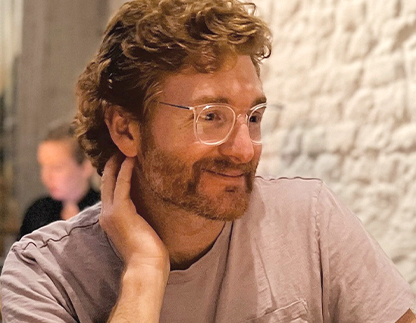Part of why I like working at a renown cultural institution within a major city is the inspiration I draw from the creativity and resiliency in the community.”
Tanner Monroe
Postdoctoral Fellow at the Center for Genetic Medicine

Dr. Tanner Monroe is a postdoctoral fellow at the Center for Genetic Medicine in the Feinberg School of Medicine. He is a geneticist and developmental biologist in the McNally Lab. Dr. Monroe’s research focuses on understanding the genetic basis of inherited cardiac diseases, with the goal of improving risk prediction and developing targeted treatments.
How would you describe your research and/or work to a non-academic audience?
I study the genetic contributions to diseases that can be passed down within families, with special emphasis on the heart. I am especially interested in complex inheritance that does not follow the familiar dominant/recessive paradigm that most people are (inappropriately!) taught. My work begins with patient cases in the clinic, which we use to 1.) build better risk predictors, and 2.) better understand disease mechanisms towards therapeutic applications. Importantly, drugs that originate with strong evidence in human genetics are more likely to show efficacy than those that do not.
Tell us what inspired your research and/or work.
I just have an insatiable curiosity about the natural world. I am drawn to genetics due to the complexity at every level—from molecular interactions within cells to the variation in DNA sequences across populations and species. It is a very satisfying field for someone like me because one day I might be culturing human heart cells or engineering new animal models of disease, and the next day I am writing code to analyze DNA sequences from a million people.
What is the biggest potential impact or implication of your work?
I have always been wary of failing the “Hamming Question,” posed by mathematician Richard Hamming, which is essentially, "What is the most important problem in your field and why aren’t you working on it?" To me, the biggest problems in medical genetics are 1.) predicting outcomes from genetic information, and 2.) relying on treatment strategies that are uninformed by genetics.
We have work coming out soon that improves severe arrhythmia risk prediction, and I am optimistic that our strategy will eventually translate into timely clinical intervention that will save lives. Additionally, our goal of better understanding the genetic causes of disease promises to enable clinicians to tailor treatments specific to the individual, thereby improving outcomes.
What books are on your bedside table?
Lately I have been reading a lot about human consciousness and the rise of civilization, partly motivated by my fascination with emergent phenomena that occur in complex systems – but I also simply enjoy thinking about the history of humanity and what, if anything, makes us unique. Though I have a stack of books eight-high at any given time, I making the most headway in The Dawn of Everything, (Graeber & Wengrow) and The Mind's I (Hofstadter and Dennett). I am hoping to read more fiction this year, though.
What inspires you?
Part of why I like working at a renown cultural institution within a major city is the inspiration I draw from the creativity and resiliency in the community. I like to think I am a decent scientist, but I have absolutely no aptitude for anything artistic. Seeing people excel in their specialty—whether it is performing arts, athletics, or architecture—inspires me to do my best work and keeps me humble. I can only hope I am living up to expectations and doing my part to enrich the community in my own way.
What advice would you give your younger self or someone considering a similar path?
1. Down in Texas, we have a saying—you ride that bull 'til he bucks you, or don't ride at all. This career is too unpredictable, and the competition is too fierce to only give half effort. There are a lot simpler ways to make a living if you aren't "all in."
2. Don't take it too seriously. Like Vonnegut said, "We are here on Earth to fart around, and don't let anybody tell you any different."
3. Good luck resolving those two!
What are you most proud of in your career to date?
I am simply proud to make a living doing this work. I am following my dream, and having that fortunate is sufficient for me ... as long as funding agencies keep letting me!
Publish Date: January 21, 2024
If you know a graduate student, postdoctoral scholar, graduate faculty member, staff member, or a member of our TGS alumni population who would make a great candidate for our TGS Spotlight Series, please complete this brief TGS Spotlight Series Nomination Form.